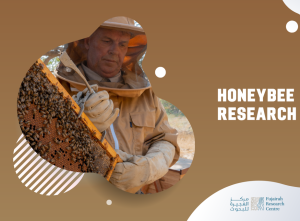
Leveraging Raw Bee Products to Enhance Product Quality and Add Value
Dr. James Arruda, a distinguished figure in honeybee research, is spearheading our exploration into the transformative benefits of raw bee products. Dr. Arruda's expertise, coupled with the contributions of our esteemed team members, Engr. Khawla Al Yamahi, Dr. Fouad Lamghari, and Saad Al Masri from ADAFSA, as well as the dedicated efforts of the Medibees team, promises to revolutionize our understanding of these natural wonders.
Under the support of the Fujairah Research Centre in the UAE, our team is at the forefront of innovation and sustainability in honeybee research. Dr. Fouad Lamghari brings his expertise in engineering and technology to our endeavors, driving advancements in hive monitoring systems and IoT integration. Engr. Khawla Al Yammahi, with her extensive background in biology and environmental science, enriches our research with a deep understanding of ecosystem dynamics and biodiversity conservation. Dr. Saad Al Masri from ADAFSA contributes invaluable insights and support, further strengthening our commitment to bee health and welfare in the UAE.
Together, we embark on a transformative journey to explore the intricate world of raw bee products. Our research encompasses honeybee feed optimization, breeding techniques, and the use of artificial insemination to enhance bee genetics. Moreover, we are committed to protecting indigenous UAE bee species, safeguarding their biodiversity and resilience in the face of environmental challenges.
Utilizing state-of-the-art technologies such as IoT and AI, we monitor honeybee behavior with unparalleled precision, empowering beekeepers with actionable insights for proactive hive management. Additionally, our participation in the Medibees program underscores our dedication to promoting bee health and combatting the global decline in pollinator populations.
Furthermore, our research delves into the botanical origin of honey, unlocking the unique flavor profiles and nutritional benefits associated with different floral sources in the UAE. From the fragrant blooms of Sidr trees to the vibrant hues of Ghaf blossoms, each botanical variety contributes to the richness and diversity of UAE honey, showcasing nature's bounty in its purest form.
Join us on this transformative journey as we harness the synergies of research, innovation, and collaboration to unlock the full potential of raw bee products. Together with Dr. James Arruda, Engr. Khawla Al Yamahi, Dr. Fouad Lamghari, Saad Al Masri, and the dedicated Medibees team, we are shaping a future where honeybees thrive, ecosystems flourish, and communities prosper.
Don't miss out on the buzz – join us today and be part of the raw bee revolution!
#HoneybeeResearch #RawBeeProducts #BeeConservation #IoT #AI #UAEBees #Medibees #Sustainability
ChatGPT
🐝 World-Leading Honeybee Expert, Dr. James Arruda, Unlocks the Potential of Raw Bee Products, Enhanced by Fujairah Research Centre Innovations! 🍯
Dr. James Arruda, a distinguished figure in honeybee research, is spearheading our exploration into the transformative benefits of raw bee products. Dr. Arruda's expertise, coupled with the contributions of our esteemed team members, Engr. Khawla Al Yamahi, Dr. Fouad Lamghari, and Saad Al Masri from ADAFSA, as well as the dedicated efforts of the Medibees team, promises to revolutionize our understanding of these natural wonders.
Under the leadership of the Fujairah Research Centre in the UAE, our team is at the forefront of innovation and sustainability in honeybee research. Dr. Fouad Lamghari brings her expertise in engineering and technology to our endeavors, driving advancements in hive monitoring systems and IoT integration. Engr. Khawla Al Yamahi, with her extensive background in biology and environmental science, enriches our research with a deep understanding of ecosystem dynamics and biodiversity conservation. Saad Al Masri from ADAFSA contributes invaluable insights and support, further strengthening our commitment to bee health and welfare in the UAE.
Harnessing the Power of Technology:
In our quest to unlock the full potential of raw bee products, we leverage cutting-edge technologies such as the Internet of Things (IoT) and Artificial Intelligence (AI). Our IoT-enabled hive monitoring systems provide real-time data on hive conditions, temperature, humidity, and bee activity. This continuous stream of information allows us to detect anomalies early, identify potential health issues, and optimize hive management practices for improved bee health and productivity.
Moreover, AI algorithms analyze vast amounts of sensor data to discern patterns, trends, and predictive indicators related to honeybee behavior and hive dynamics. By applying machine learning techniques, we gain deeper insights into the factors influencing bee foraging patterns, hive development, and overall colony health. This predictive analytics capability empowers beekeepers with actionable insights to make informed decisions and proactively address challenges in hive management.
About ADAFSA and the Medibees Program:
ADAFSA (Abu Dhabi Agriculture and Food Safety Authority) is a leading governmental entity in the UAE dedicated to ensuring the safety and sustainability of the agriculture and food sectors. The Medibees program, led by ADAFSA in collaboration with research institutions and industry stakeholders, focuses on promoting bee health and combatting the global decline in pollinator populations. Through innovative projects and community engagement, Medibees seeks to foster a sustainable future where bees thrive and ecosystems flourish.
Join us on this transformative journey as we harness the power of technology, research, and collaboration to unlock the full potential of raw bee products. Together with Dr. James Arruda, Engr. Khawla Al Yamahi, Dr. Fouad Lamghari, Dr. Saad Al Masri, and the dedicated Medibees team, we are shaping a future where honeybees thrive, ecosystems flourish, and communities prosper.
Don't miss out on the buzz – join us today and be part of the raw bee revolution!
#HoneybeeResearch #RawBeeProducts #BeeConservation #IoT #AI #UAEBees #Medibees #Sustainability
